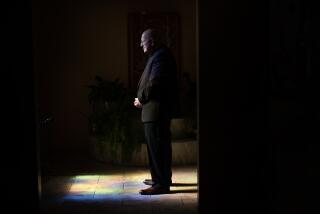BOYLE HEIGHTS : Parish Nurse Gives TLC Her Best Shot
- Share via
Nancy Robles has been hitting the streets of East Los Angeles since July, her car piled full of books about the human body and sexually transmitted diseases, pamphlets on AIDS and diagrams of the reproductive systems.
One day last week, her trunk also carried boxes of infant formula and a bag of baby-bottle nipples for a room at the Los Angeles Police Department’s Hollenbeck Division set aside for abused children.
Robles, designated a parish nurse by White Memorial Medical Center, has gone beyond the boundaries of her original job description of teaching health at area churches.
Her mission has spread to schools and community groups who ask her to talk about issues important to them. Last fall, for example, teen-age girls in the Pico-Aliso neighborhood of Boyle Heights asked for her help in dealing with the loss of loved ones in gang shootings.
“We do a lot of talking (about) the realities that are significant to them now,” said Robles, who had worked for 10 years as a psychiatric nurse at Ingleside Hospital in Rosemead before taking on this job last summer.
In the Grief and Loss group, as it was called, 16 girls talked about the deaths of their boyfriends and the difficulty in picking up the pieces and continuing their lives. Some of them brought their children, who played nearby while the group held its sessions. Robles counseled them, sometimes even visiting them at home when they were too traumatized to go outdoors.
“I think their eyes were opened,” Robles said. “Some of them who didn’t get pregnant by (their boyfriends) said they were glad they didn’t have kids because he’s not here to be with them.”
That group has evolved into a weekly health-education course in which Robles talks to the teen-age girls about anything they are curious about, such as condoms and tampons and how a baby is conceived.
On a recent Thursday afternoon, Robles pointedly told the girls that they have a right to say no to any sexual contact.
“The only person to take care of ourselves is ourselves,” she repeated more than once.
The youths giggled occasionally, passed around a box of chocolates and munched on chips and soda as they listened. They were obviously comfortable with Robles, even if the subject matter was sensitive.
“She was born and raised here, and that promotes a trust level that others wouldn’t have with the community,” said Barbara McKinley, director of physician’s services and the Parish Nurse Program at White Memorial.
The hospital’s parent corporation, Adventist Health System, encourages hospitals to join the Parish Nurse program to develop a deeper relationship with the communities the hospitals serve, McKinley said.
“It was the hospital system’s attempt to reach the different communities it serves, to be an outreach to our community,” she said.
So far, Robles is the only parish nurse employed by the hospital because of a lack of finances to expand it further, McKinley said.
Robles works with residents, physicians and student nurses to teach them about what it means to meet the community’s needs.
On a visit to give flu shots to detectives at the Hollenbeck station, Robles cared for an infant whose mother was being interviewed by detectives about child abuse. The baby had an infected belly button and seemed malnourished, she said.
Robles solicited donations from local merchants and delivered boxes of baby formula, diarrhea medicine and the bottle nipples last week. The room, which once was typical of a police interrogation room with just a table and chairs, now is equipped with children’s books, a children’s table and chairs, toys, a TV and VCR. The room, which will also be used as a children’s interview room, will be dedicated at a ceremony Thursday afternoon.
After delivering the baby formula, Robles was on her way to a meeting of hospital administrators who set policy for handling child abuse cases at White Memorial. Later, she returned to the Pico-Aliso neighborhood to meet with a teen-age girl she has agreed to mentor.
She expected to be home by 9:30 that night.
“This is not about my needs,” she said. “My needs would be to work from 8 a.m. to 4:30 p.m. and then go home. This is about meeting the needs of the community. It’s not a job that has my needs in mind. It’s less money too. I must be crazy, but I love this job.”
More to Read
Sign up for Essential California
The most important California stories and recommendations in your inbox every morning.
You may occasionally receive promotional content from the Los Angeles Times.













